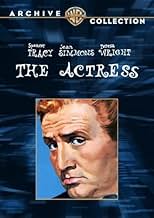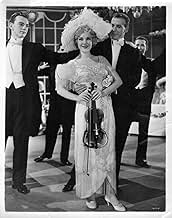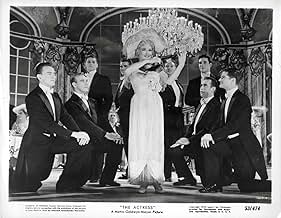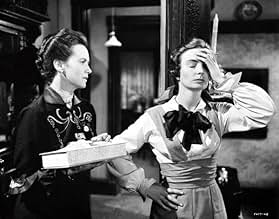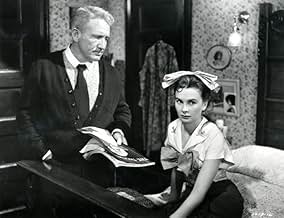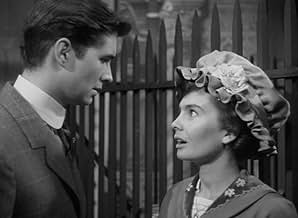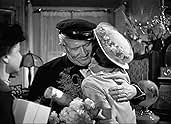AVALIAÇÃO DA IMDb
6,4/10
1,6 mil
SUA AVALIAÇÃO
Adicionar um enredo no seu idiomaThis is an account of the real life experience of actress/playwright Ruth Gordon.This is an account of the real life experience of actress/playwright Ruth Gordon.This is an account of the real life experience of actress/playwright Ruth Gordon.
- Indicado a 1 Oscar
- 2 vitórias e 3 indicações no total
Erville Alderson
- Mike McGrath
- (não creditado)
Hal Bell
- Chorus Boy in 'The Pink Lady'
- (não creditado)
Jackie Coogan
- Inopportune
- (não creditado)
Ken DuMain
- Spectator at Show
- (não creditado)
James Elsegood
- Chorus Boy in 'The Pink Lady'
- (não creditado)
Adolph Faylauer
- Spectator at Show
- (não creditado)
Raoul Freeman
- Spectator at Show
- (não creditado)
Robert Fuller
- Dancer
- (não creditado)
Ed Fury
- Dance Partner
- (não creditado)
Avaliações em destaque
This movie is so much more than a sentimental reminiscence. I'm not much at all for those "I remember..." mom or dad or whatever memory movies. Also, there are so many, many plays and movies about a family's career aspirations for a son, aspirations that get challenged because of what the son wants to do instead. Here we have a story set after the turn of the 20th century, about a working class father's career aspirations for his DAUGHTER - a career that will provide her with financial stability but isn't at all what she wants to do. Spencer Tracy plays a curmudgeon, working-class, not-at-all refined father in a role I've never seen him in before - and he's AMAZING. The dialogue has some one linters that are, at times, hysterical - any person who has every been embarrassed by their parents, or every had a parent say something like, "Why did you ever have to be so different?" will warm to this movie immediately. And the Mary Wickes moment is why she makes every movie better even if she's in it for less than 20 seconds.
This is a wonderful movie about the life of young Ruth Gordon, who would grow up to be an actress and famous writer. She was married to Garson Kanin and wrote many of the films of Tracy and Hepburn. Tracy is wonderful in one of his "dad" roles, as are the other leads in the film. Debbie Reynolds was originally to play Ruth but Simmons was cast instead and she is indeed brilliant in the movie. She is touching and very funny, very much a young girl driving her parents crazy. Tony Perkins is also very good as her boyfriend. Best of all, and not mentioned in most of the other reviews here, is Teresa Wright as the mother. She is a riot in the part and was only 11 years older than Simmons in real life. She had taken a reduction in pay for another great film, The Men, and this was one of her other really good parts in the fifties after so many great parts in the forties. The part is sort of like her last one, in The Rainmaker, as a simple kind of person. She played them wonderfully and was very funny in both.
"The Actress" released in 1953 by MGM, is a story apparently based on the life of actress Ruth Gordon. Here, a young Jean Simmons plays Ruth, "the actress." Simmons performance runs the gamut of happiness, sadness, and hopefulness -- in other words, just like many young people are. Simmons is obsessed with being an actress and will do anything for her dream. The story makes us ask ourselves: how many of us would sacrifice the life we know to pursue a dream? Anyway, the story is set in early 20th century New England, with Spencer Tracy playing Simmons father and Teresa Wright playing her mother. Tracy plays a stubborn and somewhat cantankerous role, a man hardened by life, and it just may be one of Tracy's finest performances. Wright plays the supportive mother to Simmons, although in reality Wright was only in her 30's here -- a good actress pushed prematurely into matronly roles. Both Ruth and her mother are afraid to tell Tracy about her acting ambitions, thinking he will hit the roof. Surprisingly, he does not, but he thinks she is not ready to be an actress and wants her to finish her education. One gets the impression that he had his own dreams, cut prematurely by reality -- marriage, children, and a working-class existence. The script is somewhat mundane and drags a bit at times, but the three principle actors are the real reason to watch this film. They do not disappoint. Also look for a young Anthony Perkins playing Simmons awkward boyfriend. This is not a big film, and it has some flaws, but still very much worthwhile.
10rfkeser
Delightful turn-of-the-century comedy captures the silly, head-in-the-clouds flush of adolescence. Dreaming of the glamour and magic of the theatre, small-town romantic Jean Simmons waltzes around the decidedly earthbound household of her Papa: grizzled, opinionated sea-captain Spencer Tracy, who spends his time resisting the coming of the telephone. Anthony Perkins makes a charming screen debut as her beau in a raccoon coat [although the actor preferred to downplay it]. Director George Cukor lavishes warmth and affectionate detail on Ruth Gordon's fine script as he guides the cast through some of the most satisfying ensemble playing on the screen.
Set in 1913 New England, seventeen-year-old Ruth Gordon Jones (Jean Simmons) decides on a stage career at about the same time her father decides to send her to the Boston Physical Culture Institute to become a PE teacher. His inspiration is Emma Glavey (Mary Wickes).
Despite its title, "The Actress" (1953) is really Ruth Gordon's loving tribute to her parents; written at a time when she could look back and really appreciate them. It is based on a stage play she wrote and then adapted to the screen. Although primarily known today (because of a couple of cult films) for her acting, Gordon was an excellent writer of both plays and screenplays.
If you are looking for spectacular sets and exciting action adventure, "The Actress" is not the film for you. But if you are looking for some of the best dialogue out there and what is arguably Spencer Tracy's most amusing performance you should make it a point to track this down.
Gordon obviously got her love of performing from her father Clinton (played by Tracy), a one-time sailor with a gift for gab and a desire to pontificate and be the center of attention. The conflict in the story is not so much over her desire to become an actress, but between the tendency of both father and daughter to be overly dramatic. They tend to get on each other's nerves with the mother Annie (Teresa Wright) caught in the middle. Only the mother picks up on how alike father and daughter actually are, the old acorn never falls far from the tree thing.
Much of what Clinton says is too original not to have been invented by the author. My favorite is a lengthy piece about the family's grocery bills during which Clinton complains that Ruth is too lazy to walk to a nearby farm for three pounds of butter. Annie excuses her daughter's inactivity by citing her bad back. A little later when he notices that Annie has been buying expensive tangerines instead of oranges for Ruth's school lunch, he speculates that carrying the lighter tangerine is easier on her back.
Although Wright is a little young for her role, her uncanny resemblance to Gordon (some believed that she was actually Gordon's daughter) made casting her as Gordon's mother a nice inside joke.
This production is extremely funny and has a lot of charm. They go out on a cool shot of the cat on windowsill eating a plant; with the family visible through the window heading off to the railroad station.
Then again, what do I know? I'm only a child.
Despite its title, "The Actress" (1953) is really Ruth Gordon's loving tribute to her parents; written at a time when she could look back and really appreciate them. It is based on a stage play she wrote and then adapted to the screen. Although primarily known today (because of a couple of cult films) for her acting, Gordon was an excellent writer of both plays and screenplays.
If you are looking for spectacular sets and exciting action adventure, "The Actress" is not the film for you. But if you are looking for some of the best dialogue out there and what is arguably Spencer Tracy's most amusing performance you should make it a point to track this down.
Gordon obviously got her love of performing from her father Clinton (played by Tracy), a one-time sailor with a gift for gab and a desire to pontificate and be the center of attention. The conflict in the story is not so much over her desire to become an actress, but between the tendency of both father and daughter to be overly dramatic. They tend to get on each other's nerves with the mother Annie (Teresa Wright) caught in the middle. Only the mother picks up on how alike father and daughter actually are, the old acorn never falls far from the tree thing.
Much of what Clinton says is too original not to have been invented by the author. My favorite is a lengthy piece about the family's grocery bills during which Clinton complains that Ruth is too lazy to walk to a nearby farm for three pounds of butter. Annie excuses her daughter's inactivity by citing her bad back. A little later when he notices that Annie has been buying expensive tangerines instead of oranges for Ruth's school lunch, he speculates that carrying the lighter tangerine is easier on her back.
Although Wright is a little young for her role, her uncanny resemblance to Gordon (some believed that she was actually Gordon's daughter) made casting her as Gordon's mother a nice inside joke.
This production is extremely funny and has a lot of charm. They go out on a cool shot of the cat on windowsill eating a plant; with the family visible through the window heading off to the railroad station.
Then again, what do I know? I'm only a child.
Você sabia?
- CuriosidadesFilm debut of Anthony Perkins.
- Erros de gravaçãoIn a scene late in the film, set in the kitchen, the light fixture over the kitchen table is seen (and heard!) to rise up to allow the camera to pass below it.
- Citações
Annie Jones: Ruth, why don't you give up this going on the stage business and settle down with a nice man?
Ruth Gordon Jones: Oh, mama, don't be disgusting!
- Cenas durante ou pós-créditosOpening credits are shown over the cover of a photo album, and the film begins by showing us various photos from inside the album.
- ConexõesFeatured in The Men Who Made the Movies: George Cukor (1973)
- Trilhas sonorasSilent Night, Holy Night
(1818) (uncredited)
Music by Franz Xaver Gruber
In the score for photo album pictures
Principais escolhas
Faça login para avaliar e ver a lista de recomendações personalizadas
- How long is The Actress?Fornecido pela Alexa
Detalhes
Bilheteria
- Orçamento
- US$ 1.424.000 (estimativa)
- Tempo de duração1 hora 30 minutos
- Cor
- Proporção
- 1.37 : 1
Contribua para esta página
Sugerir uma alteração ou adicionar conteúdo ausente

Principal brecha
By what name was Papai Não Quer (1953) officially released in India in English?
Responda


